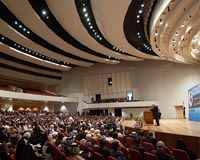| . |  |
. |
Baghdad (UPI) Nov 8, 2010 The surge in deadly bombings across Iraq this fall has intensified concerns the violence-plagued country is in the grip of what analysts call "the next insurgency." But this time it's not jihadists linked to al-Qaida who are spearheading the carnage but Sunni extremists led by former Baathist military and intelligence officers who served under the late Saddam Hussein. Much of the violence has targeted predominantly Shiite areas, including the vast slum known as Sadr City. The objective appears to be to ignite another round of sectarian savagery to deepen the political instability triggered by inconclusive parliamentary elections eight months ago. Iraq has been gripped by political deadlock with neither of the two main groupings strong enough to form a government. Former Prime Minister Iyad Allawi's secular Iraqiya alliance that has widespread Sunni support won 91 seats in the 325-member parliament. The Shiite-dominated, Tehran-backed State of Law coalition led by Prime Minister Nouri al-Maliki scored 89. The deadlock has stirred anger and frustration among Iraqis desperate for strong government and political stability as U.S. forces move toward the final phase of their withdrawal at the end of 2011. The widening violence has raised alarm that the U.S.-trained Iraqi security forces, largely dominated by the Shiite majority, will be able to contain the violence and restore a semblance of stability. One group is emerging as the spearhead of this new insurgency: Jaish Rejal al-Tariqah al-Naqshbandia, or the Army of the Men of the Naqshbandia Order, a Sufi sect associated with the dervishes. Formed in 2006, it is led by Saddam's former right hand man, Izzat Ibrahim al-Douri, and appears to be centered largely on the Sunni provinces in northern and central Iraq. JRTN, which appears to have access to hidden Baathist funds, is "rapidly becoming the most influential insurgent group in the country," Michael Knights of the Washington Institute for Near East Affairs wrote in the Gulf States Newsletter in September. Its aim is to oppose Maliki's Shiite-led government until it is replaced by an administration that includes Sunnis as well as Iraqis of all sects and backgrounds, including the military and technocratic class which ran the country under Baathist rule. That's exactly what Iran doesn't want. Tehran wants to ensure its traditional enemy never again attains the military power it had under Saddam and that Iraq remains firmly under its influence. So it is likely that Iran, through its Revolutionary Guards Corps, will continue to support Shiite militias in Iraq to counter the resurgent Baathists, blocking any hope of reconciliation and stability. Roula Khalaf, Middle East editor of the Financial Times, observed Nov. 1 that the "most threatening" aspect of the current crisis "is that some Iraqi politicians are now saying political divisions are so deep and the country so fragile that a return to authoritarian control cannot be ruled out after the departure of the U.S. troops next year "Iraq remains in danger of going back to the past before moving toward a better future." Knights says that Maliki's government, which controls much of the security establishment, is "being seen sometimes as just as clueless an occupier of Sunni areas as the U.S. military was until 2007." JRTN appears to now dominate the Islamic State of Iraq, a Sunni jihadist group linked to al-Qaida and which has been the most active jihadist faction in recent months. Knights says JRTN often funds ISI operations and has provided sanctuary for ISI commanders. These included ISI leader Abu Omar al-Baghdadi and his "war minister" Abu Ayub al-Masri, who were killed by U.S. Special Forces in Tikrit, Saddam's birthplace on the Tigris River north of Baghdad and a key JRTN stronghold, in April. It's unclear whether they were conveniently sold out by JRTN to bolster Douri's growing authority among Sunnis and eliminate possible rivals as the new insurgency gathers momentum. But that would certainly be par for the course for the elusive Douri, now 68, one of the few who survived four decades of Saddam's Machiavellian machinations and is still on the loose. Knights observes that under Douri's leadership -- he is believed to have remained inside Iraq since the March 2003 U.S. invasion -- "the carefully parsed use of terror and intimidation for organizational profit -- so different from the restless and self-defeating violence of al-Qaida in Iraq -- is deeply reminiscent of the Baath Party."
Share This Article With Planet Earth
Related Links Iraq: The first technology war of the 21st century
 Govt deal eludes Iraqi leaders as 28 dead in Shiite south
Govt deal eludes Iraqi leaders as 28 dead in Shiite southArbil, Iraq (AFP) Nov 8, 2010 Iraq's political leaders on Monday failed to agree on a proposed new power-sharing accord on the first day of all-party talks to break an eight-month deadlock as rival blocs stuck to their demands. While the Shiite, Sunni and Kurdish leaders said talks would continue in Baghdad on Tuesday and Wednesday, three car bombings in Iraq's mainly Shiite south killed at least 28 people, police and mi ... read more |
|
| The content herein, unless otherwise known to be public domain, are Copyright 1995-2010 - SpaceDaily. AFP and UPI Wire Stories are copyright Agence France-Presse and United Press International. ESA Portal Reports are copyright European Space Agency. All NASA sourced material is public domain. Additional copyrights may apply in whole or part to other bona fide parties. Advertising does not imply endorsement,agreement or approval of any opinions, statements or information provided by SpaceDaily on any Web page published or hosted by SpaceDaily. Privacy Statement |